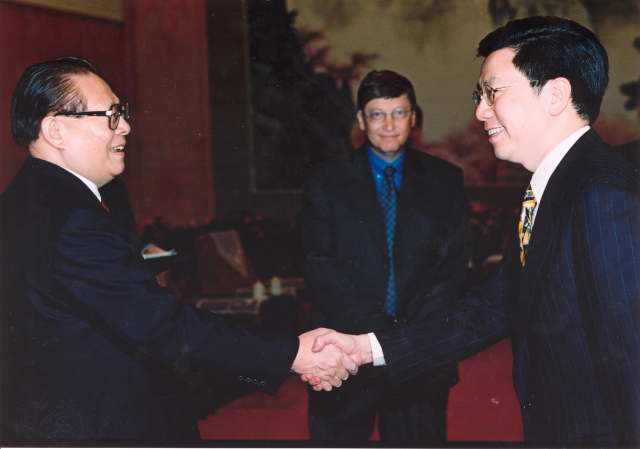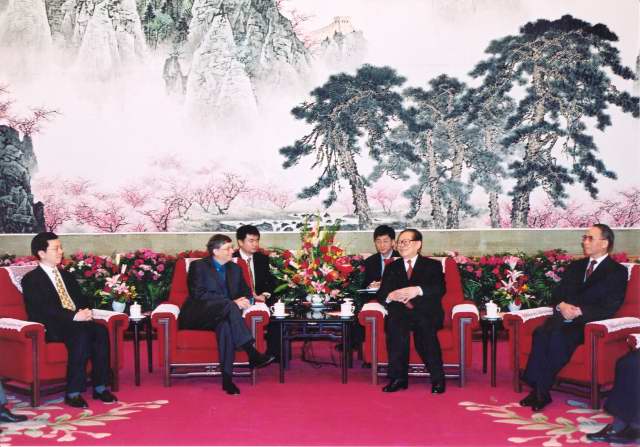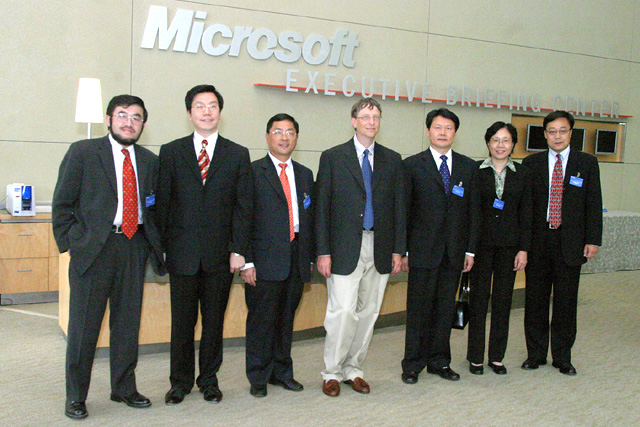October 1, 2005
Small Update
Just made a revision to initial release of ISCodeGen. Support for precedence constraints and a minor change to the installer (shortcut in start menu better named now). Keep sending feedback, this helps put focus on areas that matter most to you, the users.September 30, 2005
CODE GEN
Developers can use Code Generator for Integration Services to effortlessly obtain C# code necessary to create a programmatic equivalent of your package. Use this tool to learn about Integration Services programming model or to decrease development time of your application driving Integration Services.http://www.ivolva.com/ssis_code_generator.html
July 30, 2005
IF
(Rudyard Kipling)If you can keep your head when all about you
Are losing theirs and blaming it on you,
If you can trust yourself when all men doubt you,
But make allowance for their doubting too;
If you can wait and not be tired by waiting,
Or being lied about, don’t deal in lies,
Or being hated don’t give way to hating,
And yet don’t look too good, nor talk too wise:
If you can dream—and not make dreams your master;
If you can think—and not make thoughts your aim,
If you can meet with Triumph and Disaster
And treat those two impostors just the same;
If you can bear to hear the truth you’ve spoken
Twisted by knaves to make a trap for fools,
Or watch the things you gave your life to, broken,
And stoop and build ’em up with worn-out tools:
If you can make one heap of all your winnings
And risk it on one turn of pitch-and-toss,
And lose, and start again at your beginnings
And never breathe a word about your loss;
If you can force your heart and nerve and sinew
To serve your turn long after they are gone,
And so hold on when there is nothing in you
Except the Will which says to them: “Hold on!â€
If you can talk with crowds and keep your virtue,
Or walk with Kings—nor lose the common touch,
If neither foes nor loving friends can hurt you,
If all men count with you, but none too much;
If you can fill the unforgiving minute
With sixty seconds’ worth of distance run,
Yours is the Earth and everything that’s in it,
And—which is more—you’ll be a Man, my son!
A General Summary
(Rudyard Kipling)
We are very slightly changed
From the semi-apes who ranged
India’s prehistoric clay;
He that drew the longest bow
Ran his brother down, you know,
As we run men down to-day.
“Dowb,†the first of all his race,
Met the Mammoth face to face
On the lake or in the cave:
Stole the steadiest canoe,
Ate the quarry others slew,
Died—and took the finest grave.
When they scratched the reindeer-bone,
Some one made the sketch his own,
Filched it from the artist—then,
Even in those early days,
Won a simple Viceroy’s praise
Through the toil of other men.
Ere they hewed the Sphinx’s visage
Favouritism governed kissage,
Even as it does in this age.
Who shall doubt “the secret hid
Under Cheops’ pyramidâ€
Was that the contractor did
Cheops out of several millions?
Or that Joseph's sudden rise
To Comptroller of Supplies
Was a fraud of monstrous size
On King Pharaoh’s swart Civilians?
Thus, the artless songs I sing
Do not deal with anything
New or never said before.
As it was in the beginning
Is to-day official sinning,
And shall be for evermore!
July 24, 2005
Age discrimination and transition Kai-Fu Lee to Google
Potentially, it's possible that Dr. Kai-Fu Lee, 43 had serious concern about his further career with Microsoft. If he had some performance review issues, for example, his management at Microsoft can fire him without any problems, but by performance reasons. Then in that situation it is very difficult for him to continue work for Microsoft under conditions of potentially being fired at any minute even if he is an outstanding researcher and inventor. The big companies usually have special HR departments and can process it without any legal consequences for them. Then, the move of Dr. Kai-Fu Lee to Google is pretty natural act of self-defence.
According http://www.internetnews.com/article.php/3522796 Google and Microsoft tell different stories about how Lee fled Microsoft.
According to Google, "In early June 2005, Dr. Lee left Microsoft on sabbatical. On or about July 5, 2005, Dr. Lee informed Microsoft of his intention to resign from Microsoft at the end of this sabbatical, and that he was considering employment with Google. On July 18, 2005, Dr. Lee's last day of employment with Microsoft, he was served with a complaint" alleging breach of the non-compete clause of his contract.
According to Microsoft's complaint, Lee told his manager, Eric Rudder, that he initiated hiring negotiations with Google back in April. And a Microsoft spokeswoman told internetnews.com that Lee "never came back" from his sabbatical.

Kai-Fu Lee - new developments
According Michael Liedtke (AP Business Writer) http://news.yahoo.com/news?tmpl=story&u=/ap/20050722/ap_on_hi_te/google_microsoft_3Google retaliated with its own complaint in California seeking to override Microsoft's noncompete provision so it can retain Lee. In its suit, Mountain View-based Google contends the clause violates California laws giving workers the right to change jobs.
Now the situation looks as follows: http://blog.searchenginewatch.com/blog/050722-104916
1) On Tuesday we learned that Google has hired Dr. Kai Fu-Lee away from Microsoft to lead Google China
2) Several hours later, news that Microsoft was suing Dr. Lee in King County, WA Superior Court. The lawsuit claims that Dr. Lee was breaching the Microsoft employee confidentiality and non-compete agreements by joining Google before the agreements had expired.
3) Late yesterday (7/21/05), word that Google is was countersuing Microsoft in a California court.
Here's Great Search Wars Logo http://blog.outer-court.com/archive/2005-07-19.html#n43

July 23, 2005
Prokofiev used data mining technology...
Recently, I read in a booklet of Prokofiev's album "Piano sonatas N 2, 3, 5 and 9" the following interesting thing about Prokofiev and data analysis:Born and raised in Russia, Prokofiev established himself as the bad boy of music while studying at the St. Petersburg Conservatory. He was arrogant, willful, often misunderstood, and disliked by almost everyone. He delighted in testing the limits of his teachers, so, when asked to compose a rondo in the style of Beethoven, he could not resist "turning in pieces with confused harmonies." His teachers, despite their irritation, recognized his talent and tolerate his boldness. His fellow students, though, didn't know what to make of him. He was younger than most of them and socially naive. Prokofiev dealt with chronic boredom by keeping track of everyone's music - theory mistakes in his "notebook of demerits." He arranged them in NINETEEN columns, showing the total number of exercises, the total number of mistakes, and the number of mistakes per exercise for each student (in the form of a decimal fraction with an accuracy of one hundredth).
One of the first applications of relational databases ;-)
July 22, 2005
Kai-Fu Lee
According to Google PRhttp://www.google.com/press/pressrel/rd_china.html
Company hires Dr. Kai-Fu Lee as Vice President, Engineering and President of Google China.
Now Microsoft sues Kai-Fu over over Google's hiring.
I worked with Kai-Fu at Microsft. I did not know him in personally, but I saw his work and met him in a couple of meetings. I am almost sure he will continue work on integration of speech recognition and search in Google products.
One interesting note "One Man's Role in the Great Search War" by James Altucher,
RealMoney.com Contributor, http://www.thestreet.com
"I'm writing this because Lee had a big effect on my trading and my career" wrote Mr. Altucher. - "In 1989, I was trying to decide what graduate school in computer science to attend. I flew to Pittsburgh to check out Carnegie Mellon, where Lee was a research associate and a newly minted Ph.D.
I wanted to meet him specifically because of a 1988 paper he wrote, "A Pattern Classification Approach to Evaluation Function Learning," which described his successful attempt at creating a world champion Othello program. His program defeated the reigning champion in 1988.
When I met him, he told me he had been getting blocked on his grad-school research in speech recognition, so he took a year off to write the Othello program. Then he considered doing a similar program for the game Go, thought it too difficult, and eventually finished his Ph.D. in speech recognition, fortunately for speech-recognition users everywhere.
What does this have to do with trading? Here's how his Othello program worked. He compiled a database of thousands of winning positions. For each winning position, he would label it with a vector of variables. Among the variables were how many corners you controlled, how many squares in the center, etc.
Then, given a new random position, he used software (similar to his later speech-recognition software) to determine how close the random position (as identified by its vector of position variables) was to a winning vector. At every level, the software would chose the move that would bring it to a position that was most closely matched (statistically) with a vector from a winning position."
I recommend to read this article entirely to understand how innovation works in 21th centuary (the best way to find this article, use query "Kai-Fu Lee" with http://news.google.com).
July 14, 2005
Colin Powell and average age of Google employees
Simple Math Exercise (not asbestos or mesothelioma, of course ;-)From todays WP article "Colin Powell to join top venture capital firm" http://www.msnbc.msn.com/id/8561665
"Powell said he was energized by a recent visit to the Mountain View, Calif., headquarters of search giant Google Inc., in which Kleiner Perkins also invested.
"When I walked into the cafeteria area [to give a speech], there were about 1,000 people there," Powell said in an interview. "And I think I increased the average age by about 15 years."
Powell said he also spoke with Google founders Sergey Brin and Larry Page, discussing leadership, organization and "scaling up" a global business".
***
Well, 1,000 people and Mr. Powell guesses he increased the average age by about 15 years. We can check this out.
If Mr. Powell is 68, let A be the sum of ages of 1000 Google employees. Then, Powell's thought can be written down as the following equation
(A + 68)/1001 - A/1000 = 15
The solution to this simple equation is minus 14,947,000, that is, the average age would be minus 14,947 years. Bad news -- a negative average age ;-)
OK. Let's try to find how many employees can there be to satisfy the condition of "increasing the average age by 15".
Let X be the number of employees. Then we have the following equation:
(A + 68)/(X + 1) - A/X = 15.
We use reasonable condition A > 0. The solutions are X = 1 or 2 or 3. Not 1000. If X is even as large as 4, the average age will become negative again...
Good simple question for Google's recruiters :-)
And by the way. This simple problem has another modification - if there are 1000 people, what should be the age of 1001st person in order for him to increase the average age of the group by 15 years. The answer is...?
July 12, 2005
SSIS WIZARDS
Component Wizards for Integration Services make starting your own custom task or data flow component a snap. In just a few clicks, you get a functional base project for your task or component that can be compiled right away and added to Control Flow or Data Flow in Integration Services package designer.To begin using Component Wizards, download and install the available MSI package:
http://www.ivolva.com/ssis_wizards.html
After re-starting Visual Studio environment, you will have Custom Data Flow Component and Custom Task templates in Visual C# section of the New Project dialog.
Please send feedback.